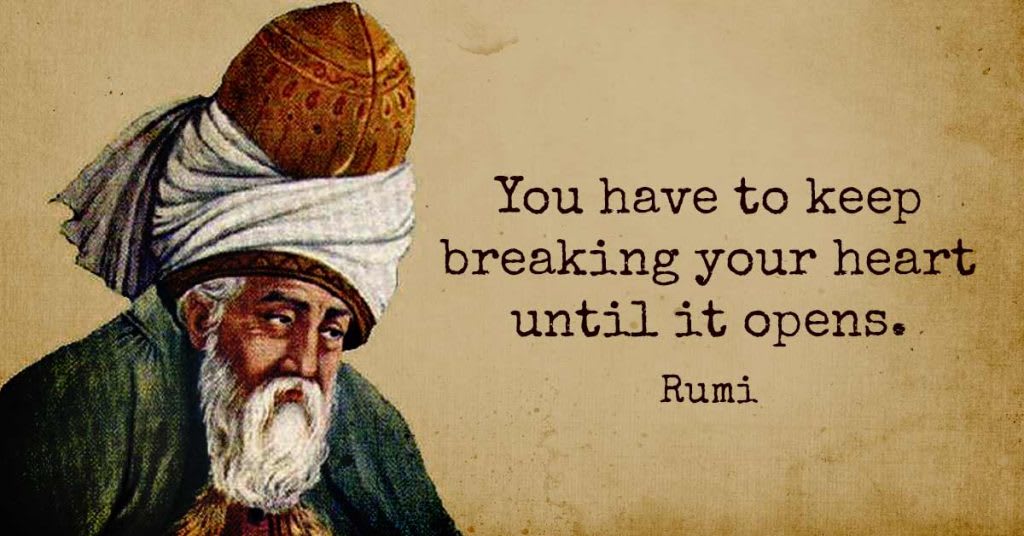
“A candle is made to become entirely flame. In that annihilating moment, it has no shadow.” This quote encapsulates the transformative power of love and the ultimate goal of spiritual enlightenment. Jalaluddin Muhammad Rumi, the eminent scholar and poet, experienced a profound shift in his life when he encountered Shams of Tabriz, a wandering dervish whose influence would lead Rumi down a mystical path that would make him one of the most celebrated poets and spiritual teachers of all time.
The story begins with a fateful interruption. Rumi was delivering a lecture when an older, unkempt man, Shams of Tabriz, approached him with a question about the nature of Rumi's academic books. Annoyed by the disruption, Rumi dismissed the man, asserting that the books contained knowledge beyond his comprehension. At that moment, something extraordinary happened: the books spontaneously caught fire. Shams, unperturbed, remarked, “You couldn’t possibly understand,” and walked away, leaving Rumi astounded and transformed.
Born in 1207 near Balkh in present-day Afghanistan, Rumi emigrated to Anatolia with his family, seeking better prospects. His father, a preacher and mystic, had hoped to secure a prestigious position. By the time Rumi settled in Konya, he had become a respected scholar of Islamic law. Although he was familiar with Sufism—the mystical branch of Islam focusing on direct experience of divine love—Rumi showed little interest in it. This changed dramatically in his late thirties with Shams' arrival. Shams' unconventional wisdom and profound spirituality sparked a deep transformation in Rumi, leading him to abandon his previous scholarly pursuits in favor of the mystical path of Sufism.
Rumi’s initial academic focus shifted towards a deeper spiritual quest. He viewed scholarly pursuits as mere candles illuminating the way to his ultimate goal: the reunification of the soul with God through divine love. He eloquently expressed this tension in his native Persian, “Love resides not in learning, not in knowledge, not in pages and books. Wherever the debates of men may lead, that is not the lover’s path.” This shift alienated some of Rumi's earlier followers, who disapproved of his growing devotion to Sufism and Shams' influence.
The practices of some Sufis, such as ecstatic dancing and composing poetry, were frowned upon by conservative religious elites. Rumi's increasing embrace of these practices under Shams' guidance attracted criticism and suspicion. When Shams mysteriously disappeared, possibly murdered, Rumi was devastated. He expressed his grief through poetry: “He bathed us like a candle in his light; in thin air vanished, left us!” Despite the tragedy, Rumi's dedication to Sufism only deepened. He engaged in ritualized dancing and preached the religion of love through lectures, poetry, and prose. Rumi saw himself as a moon reflecting Shams’ light, continuing to spread his mentor’s teachings even in his absence.
In his mystical states, Rumi composed the "Divan-i-Shams," a vast collection of lyrical poems filled with intense emotions of love and longing, not only for Shams but for the divine creator. These poems became foundational to his legacy, showcasing his transformation from a scholar to a mystic poet. As time passed, Rumi's poetry evolved. He no longer viewed himself solely as a reflection of Shams but as a source of light in his own right. In his early fifties, he wrote the "Masnavi," a series of poems offering guidance to others on discovering divine love for themselves.
The "Masnavi" is a complex and layered work, integrating ideas, stories, and quotes from Islamic religious texts, Arabic and Persian literature, and earlier Sufi writings. One of the stories Rumi included is the tale of Layla and Majnun, a famous pair of lovers in Persian literature. In Rumi’s rendition, a king demands to see Layla after hearing Majnun’s praises of her unparalleled beauty. Upon seeing her, the king is underwhelmed, unable to comprehend Majnun’s adoration. Layla explains, “I am Layla. The problem is you are not Majnun.” This story underscores Rumi's belief that true love—whether romantic or divine—requires a heart open to seeing beyond superficial appearances.
For Rumi, experiencing love meant embracing all of God's creation with an open heart, viewing everything and everyone as Majnun viewed Layla. Romantic love was seen as a microcosm of divine love, a means to transcend earthly existence and connect with the divine. This philosophy permeates Rumi’s works, which continue to inspire and resonate with people across cultures and religions.
Following Rumi’s death, his teachings gave rise to the Mevlevi Sufi order, also known as the Whirling Dervishes, in Türkiye. This order perpetuates Rumi’s legacy through ritualized dance and poetry, symbolizing the soul’s journey towards God. Rumi’s writings were disseminated widely across the Islamic world, significantly influencing Persian poetry before being introduced to the West in the 19th century. Today, his works are read, translated, and reinterpreted globally, drawing admirers from diverse backgrounds.
Rumi's message, while deeply rooted in his specific historical and Islamic context, transcends boundaries and speaks to the universal human experience. He writes, “If you have lost heart in the Path of Love, flee to me without delay: I am a fortress invincible.” This call to return to love, to seek refuge in the transformative power of divine connection, continues to resonate with readers worldwide.
Rumi’s journey from a respected scholar to a mystical poet exemplifies the profound impact of personal transformation and spiritual awakening. His encounter with Shams of Tabriz set him on a path that would redefine his life and legacy. The mystical love that Rumi experienced and expressed in his poetry transcends the confines of time and place, offering timeless wisdom on the nature of love, loss, and the divine.
In conclusion, the story of Rumi and Shams is one of profound spiritual transformation. Rumi's encounter with Shams ignited a flame within him that led to a complete shift in his worldview and his life’s work. From a scholar of Islamic law, Rumi evolved into a mystic poet whose works continue to inspire and guide seekers of divine love. His poetry, rich with themes of love, longing, and divine connection, reflects a journey of the soul towards God. Rumi's legacy, preserved through the Mevlevi Sufi order and his extensive body of work, remains a beacon of spiritual wisdom and a testament to the enduring power of love.
Rumi’s teachings remind us that the path to divine love is not found in books or scholarly debates, but in opening our hearts and experiencing the world with the eyes of a lover. His life and works encourage us to seek deeper connections, to embrace love in all its forms, and to recognize the divine within ourselves and others. In a world often divided by differences, Rumi’s message of universal love and unity continues to inspire and bring people together, highlighting the timeless relevance of his spiritual insights.
About the Creator
Agatha Aganyi
I'm a versatile content creator specializing in poetry, health, Education, Science, Mystery, and lots more, making complex topics engaging and easy to understand.
Enjoyed the story? Support the Creator.
Subscribe for free to receive all their stories in your feed. You could also pledge your support or give them a one-off tip, letting them know you appreciate their work.






Comments (1)
I love Rumi's teachings! Check this out https://youtube.com/shorts/FB6U5kIUz3E?si=giw6bWSyW4BVV599